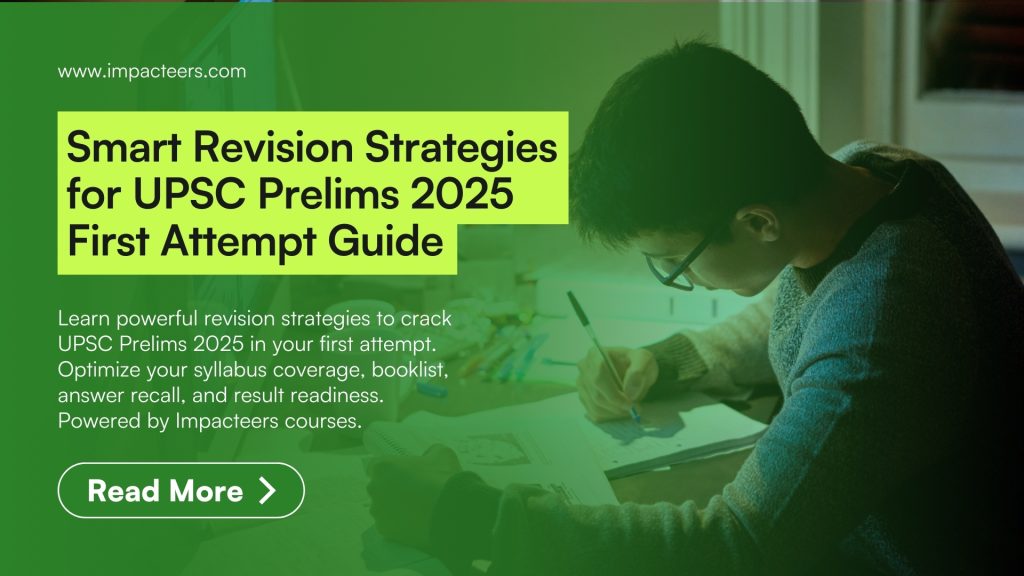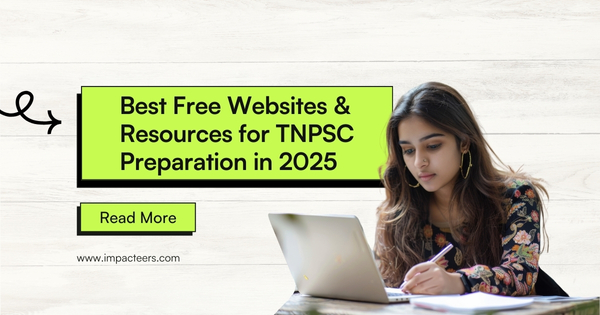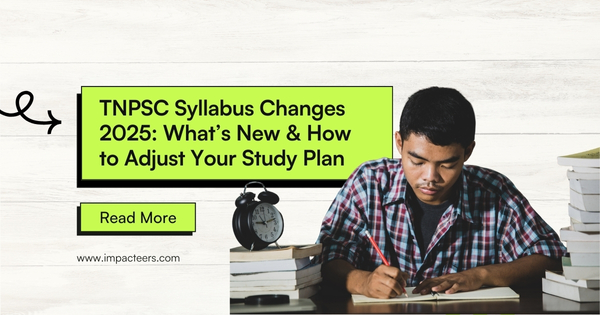Learn powerful revision strategies to crack UPSC Prelims 2025 in your first attempt. Optimize your syllabus coverage, booklist, answer recall, and result readiness. Powered by Impacteers courses.

The UPSC Civil Services Prelims 2025 is not just a test of knowledge, it’s a test of preparation clarity and recall speed. By the time the exam rolls around, every aspirant has read the same books, revised the same syllabus, and attempted countless questions. What separates the qualifiers from the rest isn’t what they studied, it’s how well they revised.
This article dives deep into smart revision strategies that helped hundreds of first-time aspirants crack the UPSC prelims exam in India, especially when they paired structured planning with guided courses like those from Impacteers.
If you’re preparing for your first attempt or aiming to break through in 2025, this guide gives you practical, time-sensitive, and high-retention strategies, no fluff, just what works.
Boost your confidence and score high with proven UPSC prelims revision strategies.
Visit Us >>>> https://www.impacteers.com/home
1. The Role of Revision in UPSC Prelims Success
Every year, lakhs of aspirants sit for UPSC Prelims, but only a small percentage clear the cutoff. Most of them don’t fail because they didn’t study hard—they fail because they:
- Forgot key facts under pressure
- Couldn’t eliminate wrong options
- Weren’t able to revise the full syllabus in time
Revision bridges the gap between preparation and performance. It’s where knowledge gets converted into recall-ready answers.
2. When Should UPSC Prelims 2025 Revision Begin?
If your UPSC prelims exam date is in May 2025, your full-fledged revision must begin by February 2025.
- Jan–Feb 2025: Final round of new content (if any) + Pre-revision notes
- March 2025 onwards: 100% focus on revision + tests
- Last 45 days: High-frequency revision, full paper simulations, elimination drills
The earlier you start revision, the deeper your retention.
3. What to Revise for UPSC Prelims? (Smart Scope)
The trick is to revise what is relevant and repeating—not everything you’ve ever read. Prioritize:
Core Static Subjects:
- Polity: Laxmikanth (must be revised 4–5 times)
- Geography: NCERTs + GC Leong
- Economy: Sriram/NCERT + Budget-Eco Survey 2024-25
- History: Modern India (Spectrum), Ancient/Medieval (Selective NCERTs)
- Environment: Shankar IAS + Current Affairs
- Science & Tech: Only from current sources (PIB, Vision/Impacteers notes)
Current Affairs:
- Monthly compilations (Nov 2024 to April 2025)
- Schemes, policies, indices, places in news
Previous Year Questions (PYQs):
- At least last 7 years of UPSC prelims paper
- Helps in understanding framing, traps, and options logic
4. The 3-Level Revision Strategy (Used by First-Attempt Toppers)
Level 1: Macro Revision (Understanding)
- Timeframe: Jan–Feb 2025
- What to do: Read entire subject once again but quickly (2–3 days per subject)
- Focus: Eliminate gaps, fill blind spots

Level 2: Micro Revision (Retention)
- Timeframe: March–early April
- What to do: Create daily slots for each subject; revise in short 2-hour sessions
- Use: Mind-maps, short notes, flashcards
Level 3: Smart Drill (Application)
- Timeframe: Last 30–40 days
- What to do: Full mock paper every alternate day
- Track: Accuracy, time taken, guesswork ratio
- Use: Impacteers’ Prelims Drill Pack—questions mirror UPSC pattern, includes elimination skill boosters
5. Time-Blocked Daily Revision Schedule
| Time | Task |
| 6:00 AM – 8:00 AM | Revise static subject (1 chapter + notes) |
| 8:30 AM – 9:30 AM | Current affairs MCQs |
| 10:00 AM – 12:00 PM | Solve 50 previous year questions |
| 1:00 PM – 2:00 PM | Revise test explanations |
| 4:00 PM – 6:00 PM | Daily full-topic test |
| 7:00 PM – 8:00 PM | Note-making or quick flash revision |
Stick to the clock. Revision without time-bound pressure is just reading.
6. Revision Techniques That Work in 2025 Prep
A. The “5-1-1” Technique
- Revise a topic 5 days after reading
- Again in 1 week
- Then again in 1 month
This space repetition model improves long-term retention by 80%.
B. Reverse Note-Making
- Read questions first → Revise that part of the book/topic only
- Builds exam-question focus, reduces wastage
C. One-Page Summary Sheets
- Every NCERT chapter or static topic should be distilled into one page
- Helps in visual memory recall in the exam
D. Use Flashcard Apps
- Digital flashcards for current affairs, facts, maps
- Sync across devices for on-the-go revision
7. Smart Use of Mock Tests (Don’t Just Solve, Analyze)
It’s not how many tests you take. It’s how well you analyze them.
- Categorize questions: Blind guess / Educated guess / Confident / Wrong memory
- Use excel sheets to track accuracy by subject
- Highlight and revise only the wrong answers
- Impacteers courses include targeted mock feedback + performance benchmarking
8. First-Attempt Focused: Avoiding Common Revision Mistakes
| Mistake | Fix It With… |
| Re-reading books again and again | Focus on notes + past question topics only |
| Ignoring CSAT | 30–45 mins practice daily + full paper every weekend |
| Memorizing without recall practice | Use active recall—close book and quiz yourself |
| Skipping PYQs | Revise PYQs topic-wise + integrate in test strategy |
9. Optimizing Last 15 Days Before Prelims 2025
These are performance days, not learning days.
- Focus only on test performance + high-frequency topics
- Revise facts, maps, economic indicators, polity articles
- Take alternate-day full mocks and analyze same-day
- Sleep 7+ hours, fix meal/sleep patterns to match exam timing
Avoid new books, new material, or experimental guess strategies now.
10. How Impacteers Courses Accelerate Smart Revision
Impacteers Prelims Mastery Program 2025 includes:
- Daily high-YTM (Yield to Marks) revision sessions
- Curated MCQ capsules built from PYQ trends
- Smart test-series calendar matched to UPSC exam cycle
- Real-time dashboards tracking your accuracy and performance index
- Special CSAT modules + elimination skill bootcamps
Designed for working aspirants and first-time candidates, it delivers outcome-oriented revision, not just content overload.
Conclusion
In the run-up to UPSC Prelims 2025, don’t let scattered efforts undo months of study. Smart revision is your secret weapon. It doesn’t just sharpen memory—it builds exam confidence, reinforces strategy, and primes you for the real paper.
Use repetition. Use reflection. Use tests as a mirror.
Master your exam prep with these effective UPSC prelims revision strategies designed to boost recall and accuracy.
And most importantly—use structured guidance. Courses like those from Impacteers are crafted not to dump content but to accelerate your results through smart revision hacks, curated questions, and real-time feedback.
Because in the UPSC journey, what you revise is what you remember. And what you remember is what you write.
About Us >>>> https://blog.impacteers.com/
Frequently Asked Questions (FAQs)
1. When should revision ideally begin for UPSC Prelims 2025?
Ideally by February 2025, you should switch from learning to revising. This gives 90–100 days for structured, layer-wise revision before the UPSC exam.
2. Is it okay to skip books and revise only from notes?
Yes—if your notes are complete and mapped to the syllabus. Re-reading full books at this stage wastes precious time.
3. How many times should I revise before the prelims?
For static subjects: 3–5 times. Current affairs: 2–3 thorough cycles. PYQs: At least 2–3 complete revisions with explanation analysis.
4. Should I attempt full mock tests every day in April–May?
No. One mock every 2 days is ideal. Use the alternate day to revise explanations and identify improvement areas.
5. How does Impacteers help with revision in prelims preparation?
Impacteers offers a revision-driven course structure, focused test series, elimination hacks, performance analysis tools, and mentorship to plug revision gaps before UPSC Prelims 2025.


Post Comment